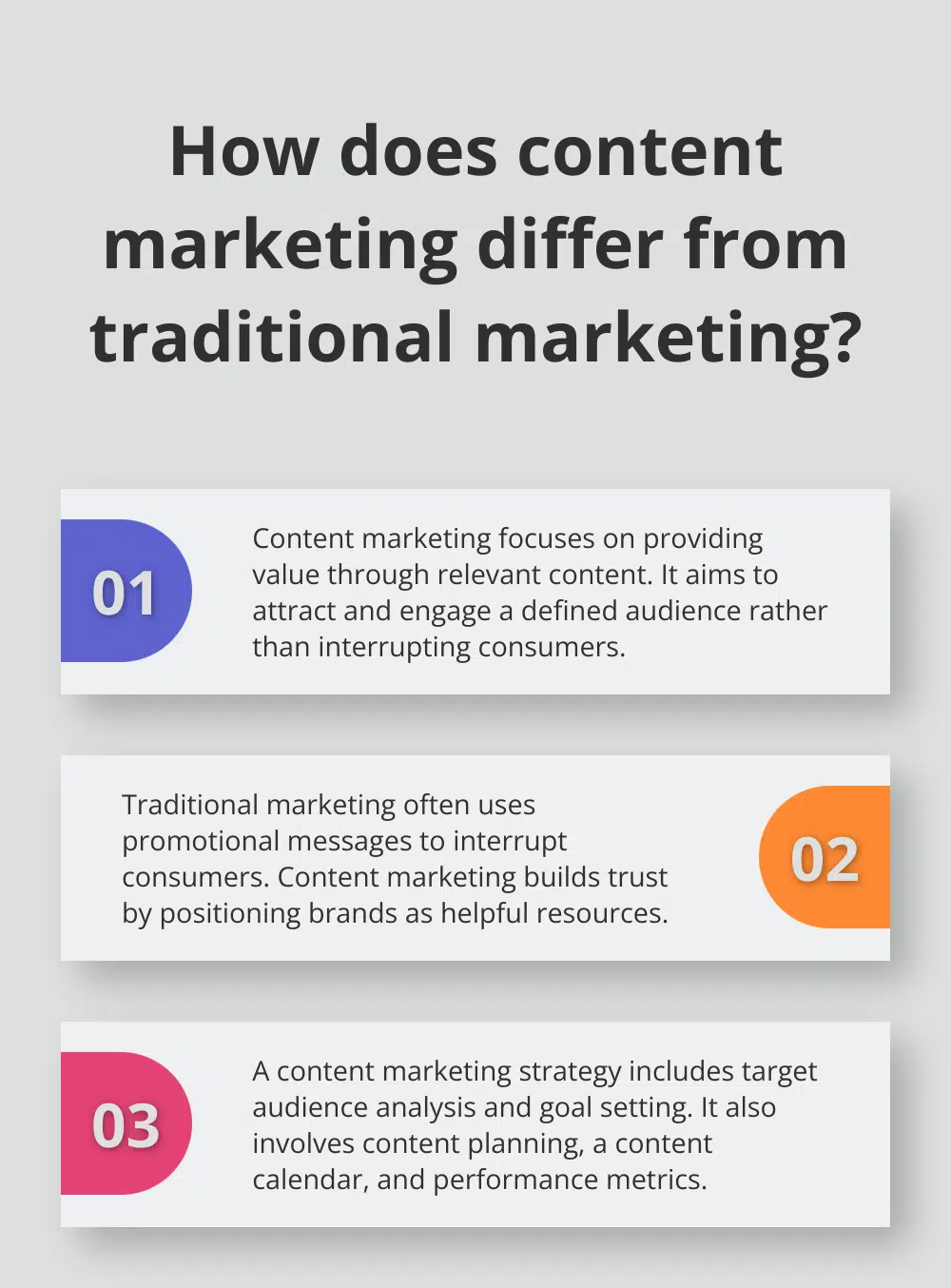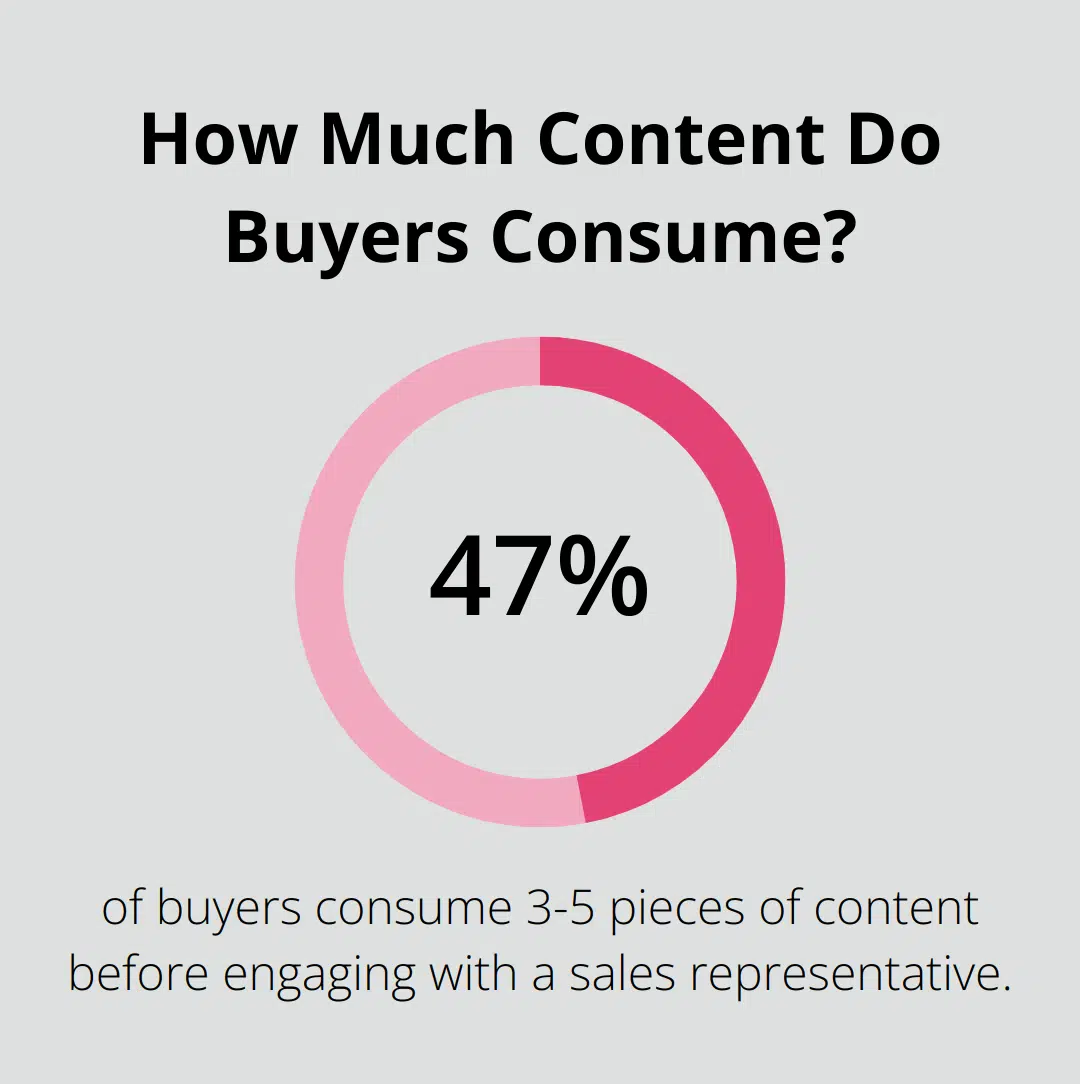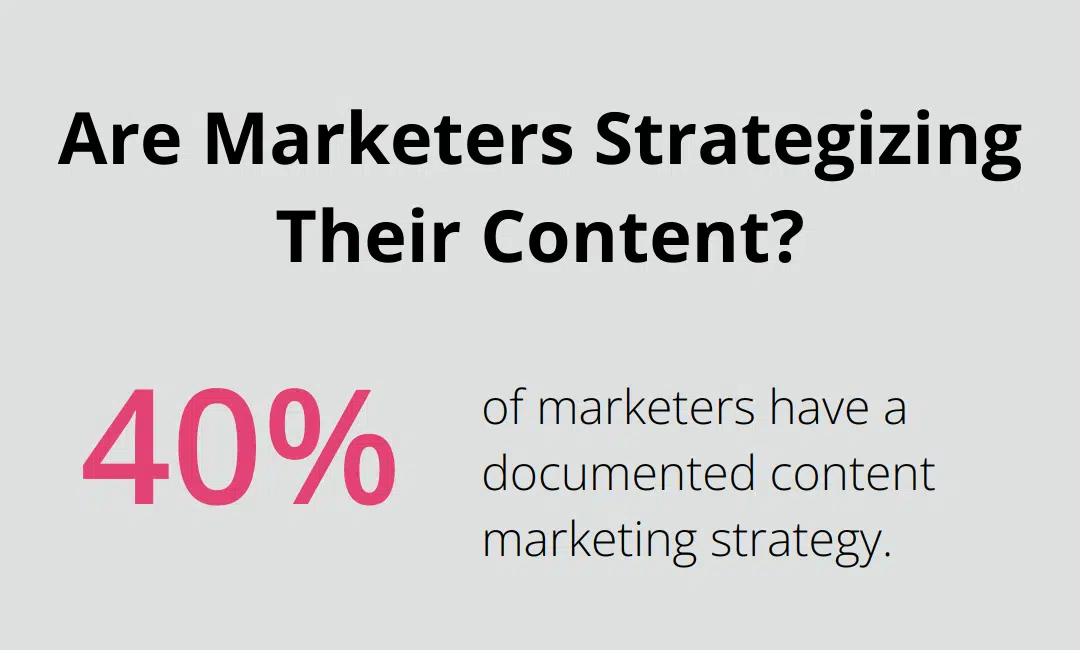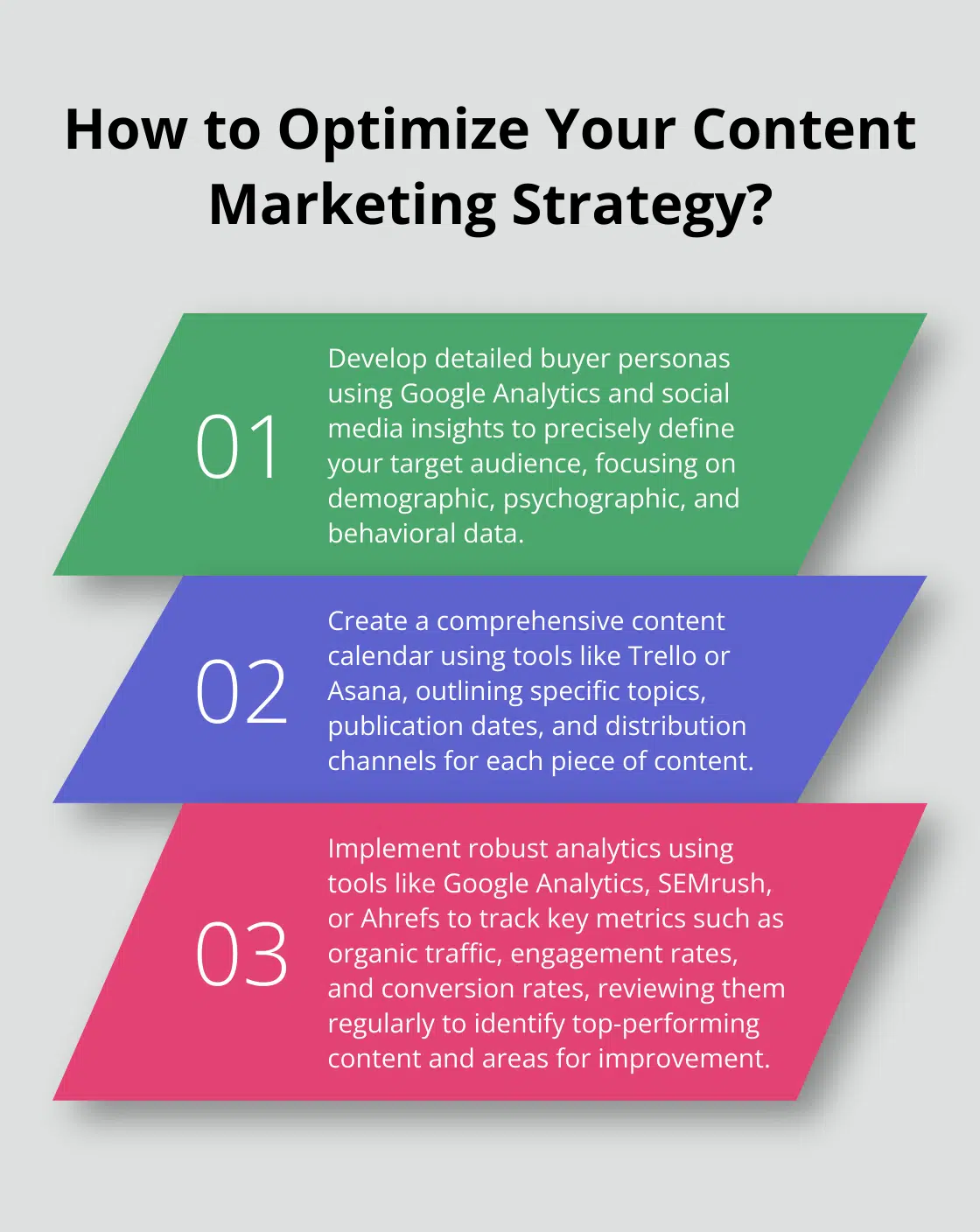Content marketing is a powerful tool for businesses, but many struggle to harness its full potential. At Made Simpler, we often hear the question: “Why do you need a content marketing strategy?”
The answer is simple: a well-crafted strategy can transform your marketing efforts, boost your online presence, and drive real business results. In this post, we’ll explore the key reasons why a content marketing strategy is essential for your business success.
What’s a Content Marketing Strategy?
Defining the Essence
A content marketing strategy serves as a comprehensive roadmap for your content creation and distribution efforts. It aligns these activities with specific business goals, transforming your online presence and driving measurable results.
Key Components of a Robust Strategy
A solid content marketing strategy incorporates several essential elements:
- Target Audience Analysis: This involves identifying your ideal customers and understanding their pain points. This knowledge enables you to create content that resonates with potential clients.
- Goal Setting: Your strategy should define clear, measurable objectives tied to your business aims (e.g., increasing website traffic or boosting sales conversions).
- Content Planning: This outlines the types of content you’ll produce (blog posts, videos, podcasts, etc.) and the channels you’ll use for distribution.
- Content Calendar: A well-structured calendar ensures consistent publication and helps maintain audience engagement.
- Performance Metrics: Your strategy should include a plan for measuring and analyzing content performance to guide future improvements.
Content Marketing vs. Traditional Marketing
Content marketing takes a fundamentally different approach compared to traditional marketing methods. While traditional marketing often interrupts consumers with promotional messages, content marketing prioritizes providing value. It focuses on creating and distributing relevant, useful content that attracts and engages a clearly defined audience.

For instance, instead of running a TV commercial about your product, you might create a how-to video that solves a common problem your target audience faces. This approach builds trust and positions your brand as a helpful resource (rather than just another company trying to sell something).
Aligning Content with Business Objectives
The ultimate goal of a content marketing strategy is to drive profitable customer action. This could mean different things for different businesses:
- Generating qualified leads for the sales team
- Increasing online sales
- Boosting brand awareness
- Improving customer retention
A well-crafted strategy helps businesses achieve these objectives through targeted content efforts. For example, one company saw a 150% increase in organic traffic within three months of implementing their new content strategy.
The Dynamic Nature of Content Strategies
An effective content marketing strategy isn’t static. It should evolve based on performance data and changing business needs. Regular analysis and optimization play a key role in long-term success. This adaptability allows businesses to stay relevant in an ever-changing digital landscape and continue to meet their audience’s needs effectively.
As we move forward, let’s explore why your business needs a content marketing strategy and how it can significantly impact your overall marketing efforts.
Why Your Business Needs a Content Strategy
Amplifying Your Brand’s Online Presence
A well-executed content strategy boosts your brand’s visibility significantly. The Content Marketing Institute reports that companies with a documented content strategy are 313% more likely to succeed in their marketing efforts. This increased visibility translates to more exposure for your brand, products, and services.
Establishing Authority in Your Industry
Quality content positions your brand as an industry leader. HubSpot’s research indicates that 47% of buyers consume 3-5 pieces of content before engaging with a sales representative. Consistent production of valuable, informative content builds trust with your audience and establishes your company as a go-to resource in your field.
Fueling Your Sales Funnel
Content marketing proves to be a powerful tool for lead generation. Learn more about what content marketing is, how it can benefit your organization and how to get started using this technique to promote your company. This efficiency makes a content strategy a cost-effective approach to filling your sales pipeline.
Improving Search Engine Rankings
A solid content strategy enhances your website’s search engine optimization (SEO). Search engines favor websites that consistently publish high-quality, relevant content. This increased visibility in search results drives more organic traffic to your site, potentially leading to higher conversion rates.
Supporting Other Marketing Efforts
Content serves as the foundation for various marketing initiatives. It provides material for social media posts, email campaigns, and paid advertising. A comprehensive content strategy ensures consistency across all marketing channels, reinforcing your brand message and maximizing the impact of your overall marketing efforts.

As we move forward, let’s explore the key elements that make up an effective content marketing strategy. Understanding these components will help you create a robust plan tailored to your business goals and target audience.
Crafting Your Content Strategy Blueprint
Pinpoint Your Audience
Define your target audience with precision. Create detailed buyer personas based on demographic data, psychographic information, and behavioral patterns. Use tools like Google Analytics and social media insights to gather this data. For example, if you’re a B2B software company, your primary persona might be “Tech-Savvy Tom,” a 35-45-year-old IT manager in mid-sized companies who values efficiency and cost-effectiveness.
Set SMART Goals
Establish Specific, Measurable, Achievable, Relevant, and Time-bound (SMART) goals for your content strategy. Instead of vague objectives like “increase website traffic,” aim for specific targets such as “boost organic traffic by 25% within six months through weekly blog posts and monthly whitepapers.” This clarity helps align your team and measures progress effectively.
Choose Your Content Mix
Select content types that resonate with your audience and align with your goals. According to the Content Marketing Institute, 40% of marketers have a documented content marketing strategy. Without a strategy, too many content marketers are creating content for the sake of it. This might include a combination of blog posts, videos, podcasts, infographics, and ebooks. For instance, if your audience prefers visual content, prioritize video production and infographics over long-form articles.
Build a Content Calendar
Develop a comprehensive content calendar that outlines topics, publication dates, and distribution channels. Tools like Trello or Asana can help manage this process. According to HubSpot, if your blog isn’t at least a year old, you should aim to publish 6-8 posts a month around a few important and promising topics.
Measure and Analyze
Implement robust analytics to track your content’s performance. Use tools like Google Analytics, SEMrush, or Ahrefs to monitor key metrics such as organic traffic, engagement rates, and conversion rates. Review these metrics regularly to identify top-performing content and areas for improvement.

Final Thoughts
A well-crafted content marketing strategy forms the cornerstone of successful digital marketing in today’s competitive landscape. We explored why you need a content marketing strategy and how it transforms your business’s online presence, builds trust with your audience, and drives measurable results. Your content efforts, when aligned with specific business goals, create a powerful engine for growth and customer engagement.
Made Simpler offers scalable, high-quality marketing solutions enhanced by AI technology. Our team provides the tools and expertise you need to elevate your content marketing efforts (from SEO-optimized blog content to comprehensive social media management). We use a streamlined five-step process to deliver tailored, effective marketing assets that align with your unique business goals.

A successful content marketing strategy requires ongoing creation, analysis, and optimization. You build a strong online presence, establish your brand as an industry leader, and drive long-term business growth through consistent delivery of valuable content to your audience. Start your content marketing strategy today to unlock the full potential of your digital marketing efforts.

